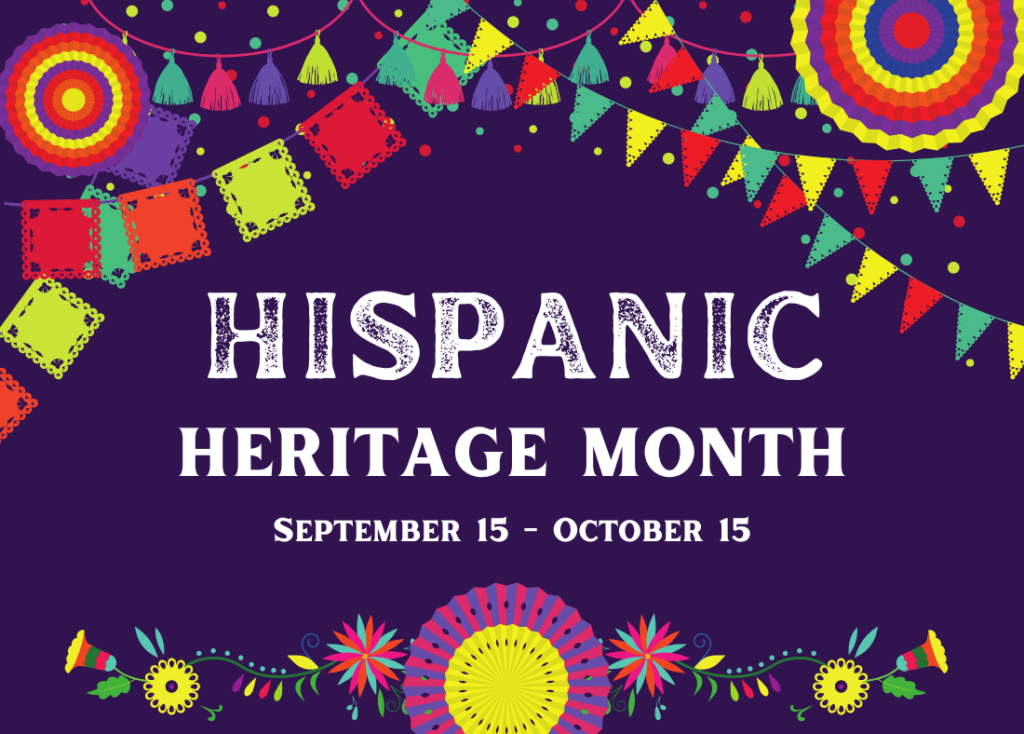By Monica Gil dos Santos, Marketing and Communications & JEDI Committees

From September 15 to October 15, National Hispanic Heritage Month is a celebration created to honor Hispanic Americans’ histories, cultures, and contributions.
This celebration was first introduced by President Lyndon B. Johnson as National Hispanic Heritage Week in 1968 “to pay special tribute to the Hispanic tradition.” Johnson created this week to celebrate the Independence Day of five Latin American countries – Costa Rica, El Salvador, Guatemala, Honduras, and Nicaragua – that earned their independence from Spain on September 15. With Mexico, Chile, and Belize celebrating their independence from Spain and the United Kingdom on September 16, 18, and 21, the week was extended by President Ronald Reagan to the first Hispanic Heritage Month in 1988.
According to the Census Bureau, the U.S. Hispanic population is 60.6 million as of July 1, 2019. This makes people of Hispanic origin the largest ethnic or racial minority in the USA. Throughout the country, Hispanics help advance our economy, improve our communities, and bring a diverse and vital perspective to social, justice, and environmental issues. Yet, they are one of the marginalized communities disproportionately impacted by climate change.
Housing Discrimination and Environmental Injustice
All over the world, marginalized groups and minority communities, especially people in low- and lower-middle-income countries, have been impacted by the increasing effects of climate change. A recent study by the GermanWatch found that the countries most affected by climate disasters are in the Global South, such as Mozambique, Zimbabwe, Puerto Rico, Bolivia, and Haiti.
Also in the U.S., people of color suffer from many environmental injustices. For example, is it no secret that there is still residential segregation. People of minorities tend to live in neighborhoods considered “hazardous” by lending institutions, giving them no opportunity to improve their housing or economic situation.
According to a study published by Proceedings of the National Academy of Sciences in 2019, Hispanics breathe 63% more air pollution that leads to health damage than they make, while non-Hispanic whites are exposed to 17% less air pollution than they make.
In California, some regions are advised to stay indoors to avoid outdoor pollution exposure on hot days, potentially being stuck in a home without cool air. For example, 64% of disadvantaged communities in southern Los Angeles live below the poverty level with no access to air conditioning or affordable energy, making them more vulnerable to hot temperatures during heat waves due to global warming.
All over the world, people of color and low-income communities are less responsible for climate change yet more vulnerable to the effect of climate change, including heatwaves, storms, hurricanes, floods, and other disasters.
Driving Change in Climate Injustice
This year, we want to show you some ways to celebrate National Hispanic Heritage Month:
- Listen to and learn from Latinx organizers.
- Donate to organizations advocating for marginalized people of color and/or environmental justice, such as Environmental Health Coalition and Latino Coalition for a Healthy California.
- Get involved in climate action and volunteer, for example with SanDiego350.
- Support small-scale Hispanic farmers and businesses, such as Andrés Latin Market.
- Advocate for federal action to reduce emissions of pollutants that cause global warming and affect human health.
- Call on elected officials to protect most vulnerable communities from climate hazards and invest in equitable solutions to the climate crisis.
¡Sí se puede!
Here is how you can get involved with SanDiego350:
Fill out our volunteer interest form or email us at volunteer@sandiego350.org for more information.
